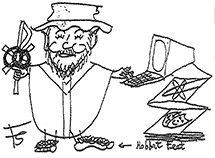“All, or nothing at all,” whined the crooners of our youth: love was demanded fully, no holding back. And this call still goes out in different words from the Storm Troopers of religion, and we are told that if we strip off even a glove or a handkerchief from our religious clothing we shall soon be left in the nakedness of doubt and disbelief.
There are scientific warriors, too, who take the same line. Once you let a glimmer of subjectivity into your calculations, a jot or tittle suggesting external purpose, you have rejoined the fringe thinkers and next thing you’ll be examining the entrails of a chicken or a worm.
Happily, there are science thinkers who will come to the rescue of the whole person of the scientist whose subjectivities are like anyone else’s. Gerald Holton studies scientists from Kepler to Einstein in his book “Thematic Origins of Scientific Thought,” and shows that for every scientist who measures his/her findings on a graph of X observation and Y analysis, there is also a Z factor which is the scientist’s own inclination to choose this approach rather than that.
Robert Browning writes about a bishop, Sylvester Blougram, responding to an interview with a newspaper man Gigadibs, who is an unbeliever.The journalist presses the bishop hard, and the bishop replies, arguing this way and that way, well over the head and under the defences of the layman, for over a thousand lines of blank verse in a dramatic monologue. Blougram is willing to acknowledge doubts, but he says if once you cut away “excrescences” you’re inevitably on the downhill road to no faith at all:
To such a process I discern no end,
Clearing off one excrescence to see two;
There’s ever a next in size, now grown as big,
That meets the knife - I cut and cut again!
First cut the Liquefaction*, what comes last
But Fichte’s clever cut at God Himself!
Gigadibs was sufficiently frightened that he emigrated to Australia to “test his plough,” and study “the last chapter of St John.”
Isn’t this what we expect of officialdom, whether in church or state? “We can’t take this bold initiative because all these other things might happen.”
But the path of faith is a path of trust, trust not only in our fellow creatures, human or wiggly, but trust in a Being Who is a Person, and the trust is fed by love. When William Blake said “if the sun or moon should doubt, they’d immediately go out!” he was referring not to the energizing doubt which is springboard of faith, but to the lack of trusting love in the One who holds our hand:
I said to the man who stood at the gate of the year:
“Give me a light
that I may tread safely into the unknown.”
And he replied:
“Go out into the darkness and put your hand into the Hand of God.
That shall be to you better than light, and safer than a known way.”
(Minnie Louise Haskins, quoted by King George VI in his Christmas broadcast, 1939, World War II)
*Liquefaction: some miraculous appearance of blood on a religious art work.

